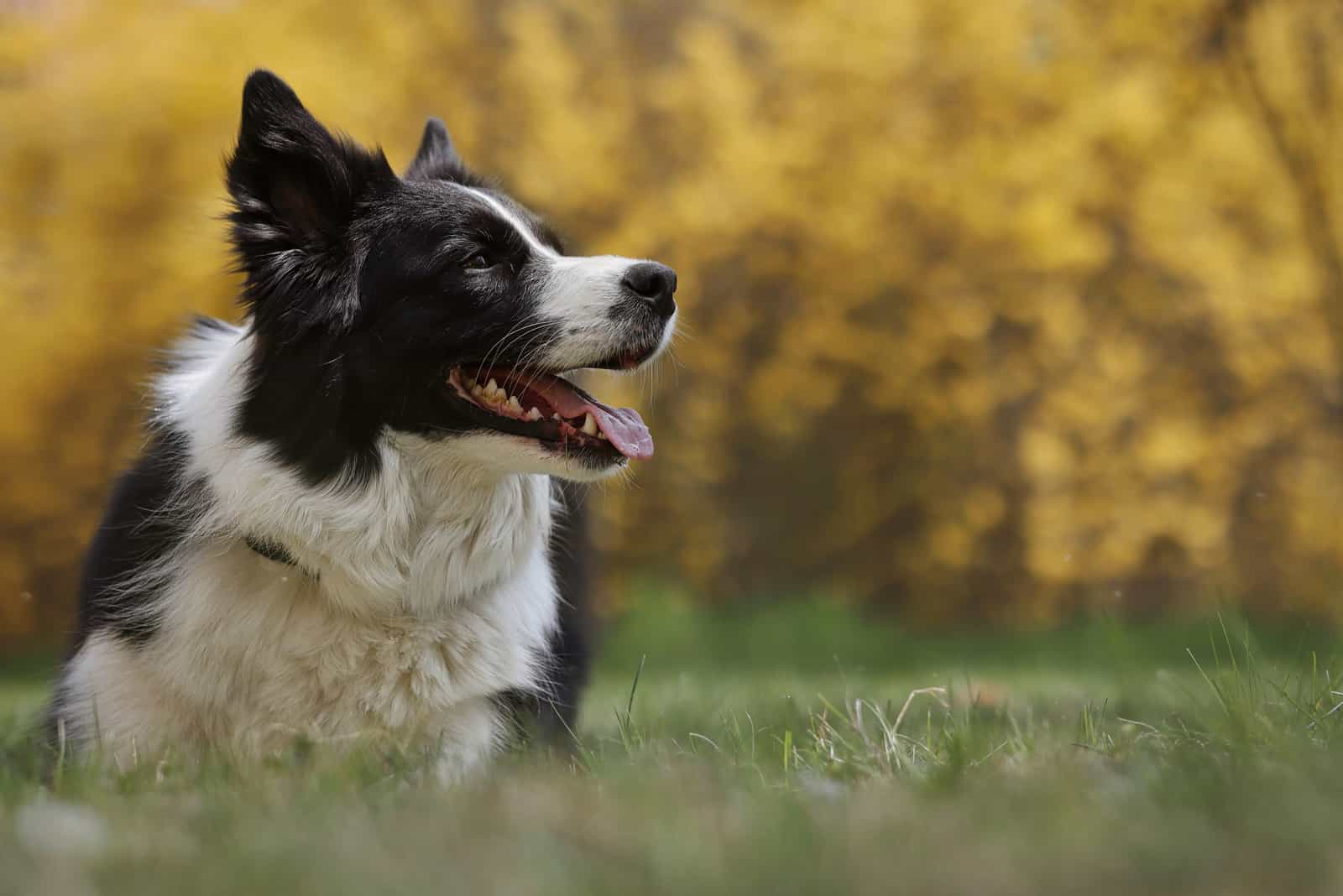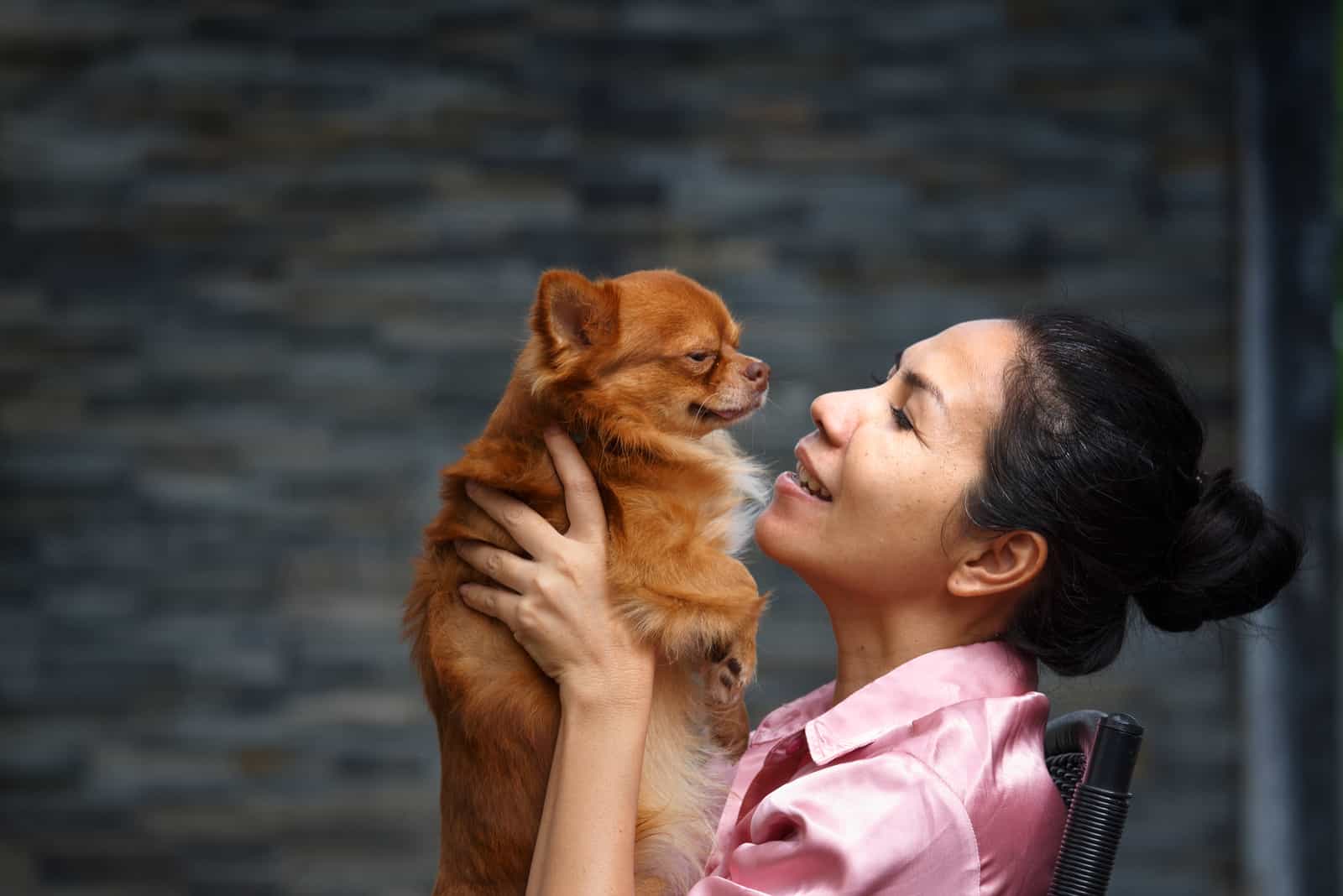Any change in behavior might be an alarm for a dog owner. Figuring out what exactly is the problem (and whether there is one at all) might be challenging, but as soon as you ask yourself, “Why does my dog stare into space?”, you’re already on a good path to solving the issue.
There are various reasons why a dog might be staring into space. In most cases, blank staring represents a symptom of a medical condition, but it can also be a simple natural reaction that doesn’t require any further action.
It’s not easy to give a specific answer to the question, “Why does my dog stare into space?” without causing any concern, which is why I created a list of possible reasons for such behavior with all the information you may need before you pay a visit to the vet.
Read on to find out why your dog seems to be making eye contact with blank spaces and walls instead of humans and other dogs.
Why Does My Dog Stare Into Space?

There are several reasons why your dog might be staring off into nothing.
The most common reasons for this specific behavior are listed down below.
These stares might be just a natural reaction that your dog has to something you can’t hear, but they can also be a symptom of an underlying condition.
Check out the rest of this article in order to discover why your dog stares into space!
1. It might be onto something.

Dogs are known for an amazing sense of hearing, which is much more sensitive than humans. Dogs can detect sounds four times better than us, which might be one of the reasons why your dog stares at seemingly nothing.
Your dog might be hearing sounds in the house that are inaudible to you. One of the possible reasons for staring are critters that you might not be aware of.
It might look to you as if your furry friend is looking at an empty space, but it might be trying to solve the mystery of unusual sounds in your house.
It’s not easy to recognize the exact cause of the dog’s behavior, but if you pay attention to your pet, it won’t take long until you finally get the idea as to why your doggie keeps staring at nothing.
If your pet tilts its head from time to time as a sign that they’re trying to figure out something, they’re definitely hearing sounds that you can’t detect.
Your dog seems to be telling you that it’s time to call the exterminator, which just proves that dogs are an extremely helpful part of every family and household.
2. It might be asking for your attention.

Furry pets are just as manipulative as they are cute! They know how to get what they want from their owners, especially when it comes to petting, cuddles, and food.
Of course, you won’t find anything wrong in petting your dog when it stares into space, but that might actually be the true intention of that clever and adorable ball of fur.
Once you give in, your doggie will repeat this odd behavior every time it wants cuddles, and you won’t stand any chance.
If your doggo starts wagging its tail every time you cuddle it after it has spent time staring at nothing, the answer is clear – it has found a way to get cuddles whenever it wants.
This is not necessarily bad behavior, but it might turn into it if you continue rewarding your dog for staring at a blank space.
Instead of cuddling your pet every time it repeats the same behavior, you may want to distract it by giving it a task instead of giving in to cuddling.
3. Various medical issues.

Unfortunately, this type of behavior might be a symptom of a number of underlying conditions that affect your dog’s mental and physical health.
Of course, there’s no reason to immediately think of the worst-case scenario. Still, it’s better to pay more attention to your dog’s behavior and check if there are any other symptoms that might determine the cause of such behavior.
It could only be an attention-seeking gesture, but it’s always better to check in time.
There are a great number of health issues that can cause such behavior, from cancer to eyesight and hearing impairment.
Some of the most common medical issues are listed below.
4. Eyesight troubles.

If your doggie can’t see well, it’ll just stare at nothing because the poor thing might not even realize what it’s looking at.
There are high chances your dog’s eyesight will weaken as it gets older, which is why it sometimes stares at blank spaces convinced that something is located in front of it. Unfortunately, in most cases, it’s just their eyes deceiving them.
If you notice that your pet is having trouble finding its food bowl or its favorite toy if you move them just a bit from their regular places, your canine is probably having eyesight issues.
If you’re worried about your dog’s eye health, you can consult a veterinarian for further details and examinations.
5. Canine cognitive dysfunction syndrome.

Some of the first symptoms of canine cognitive dysfunction syndrome (CCD) are cognitive decline, blank staring, confusion, and distance from human interaction.
This medical condition is also called dog dementia, although it resembles Alzheimer’s disease more than dementia. The main causes of this illness are physical and chemical changes in the brain that come naturally with old age.
One of the main symptoms of dementia is staring at walls without any reaction. The other symptoms might include anxiety, disorientation, insomnia, and desocialization from other dogs or people.
If a senior dog shows any of the following behaviors, it might have CCD:
• Can’t use the stairways and doors by itself
• Fails to recognize its dog owner, family members, favorite toys, etc.
• Becomes uninterested in walks, games, or going outside in general
• Doesn’t respond to its name
• Gets sleep-wake inversion (sleeps during the day, stays awake during the night)
• Walks aimlessly throughout the house
• Gets lost in the house, back yard, or other familiar places
• Pees or poops inside the house no matter how often it goes outside.
• Gets stuck behind furniture or walks into room corners
• Starts shaking without any reason while standing or lying down
• Doesn’t react to commands
• Has difficulties following the dog training regimen including memorizing new commands, tasks, or routes
• Doesn’t seek owner’s attention or praise
• Stares into space or at walls, and becomes afraid of interior lighting, the television, and other visual and audio stimuli
• Hesitates from eating dog food, drinking water, or taking any treat
If you notice that your dog demonstrates any of the behaviors mentioned above, it’s time to call the vet.
Fortunately, CCD can be treated, but there are other diseases with similar symptoms that might cause serious conditions if not treated in time.
Make sure to react promptly in order to know what you and your furry friend are up against.
6. Infections.

This may come as a surprise to some dog owners, but different types of infections can be common reasons for canine disorientation.
But, before we continue, let’s discuss the key signs of dog disorientation:
• Head tilting
• Darting eyes
• Head tremors
• Inability to stand
• Vomiting
• Motion sickness during car rides
• Sudden falls
Disorientation may occur as an acute condition, but it may get worse over time depending on the exact cause.
A Urinary Tract Infection (UTI) can cause disorientation, but if it’s not treated in time, it can lead to a more serious condition such as Cystitis.
Cystitis is a bladder infection that causes great discomfort and pain. Some of the clinical signs of this infection are frequent urination and hematuria (blood in the urine).
If you notice that your dog is urinating more than usual, you should contact a vet.
Other infections that might be the answer to why your dog just stares into space are:
• Bacterial infection
• Tooth infection
• Kidney or lung infection
• Ear infection
• Wound infection (scratches, bites, or cuts)
In case you’re wondering how you can recognize these infections, here are some of the most common signs:
• Coughing
• Dry nose
• Vomiting
• Lack of energy
• Shivering
• No appetite
• Warm nose and ears
7. Seizures.
Unfortunately, seizures or epilepsy are a common occurrence among dogs.
But, the main issue is that dog seizures aren’t always easy to detect as they can be expressed in various ways.
Staring into space or at a wall can be a sign of a partial seizure, also known as a focal seizure.
This type of seizure isn’t as obvious as a full-on attack, which is manifested by shaking, frothing at the mouth, and convulsions.
If your dog stares blankly into space and repeats this new behavior regularly, it’s time to look for an expert opinion.
Focal seizures might be caused by a variety of other conditions, from cancer and poisoning to epilepsy. Take your dog to the vet as soon as possible to exclude such serious medical conditions and begin treatment in time.
Another type of seizure that involves similar symptoms is the absence seizure. This medical condition is described as a milder form of epilepsy or “petit mal” (blank staring not followed by convulsions).
8. Compulsive behavior.

Photo from: @spitzverliebt
Dogs can have an irresistible impulse to perform a certain action or behavior, which doesn’t make any sense at the moment.
It’s important to understand that these behavior changes can’t be controlled. Some dogs might repeat one or more actions inadvertently to the extent of exhausting themselves.
There are various displays of compulsive behavior, such as:
• Barking
• Shadow chasing
• Blank staring
• Spinning
• Excessive chewing and licking
• Toy fixation
It’s hard to say what exactly causes this type of behavior, but there might be certain reasons that can serve as a trigger for this compulsive behavior:
• Fear of entering a familiar place (for example, the dog might hesitate to go outside to pee or poop because of a traumatic experience)
• Physical abuse and punishments
• Lack of socialization with other dogs and humans
• Regularly tied up or forced to stay in a small space
• Attacked by other dogs in the family
In some cases, dogs with compulsive behavior might appear like aggressive canines, but keep in mind that the main cause of such behavior is usually fear.
The more attention you give your dog, the better it’ll feel, and the sooner it’ll heal!
9. Depression.

Dog depression can’t be equated with the human condition, but there are some similarities between the two, especially when it comes to symptoms.
Losing interest in things that once made your dog excited and over the moon, irregular sleeping habits, staring at the wall or into space, and a loss of appetite are all signs that your dog might be in depression.
This condition may not be easy to identify in dogs, but if you notice that your dog sleeps more or less than before, doesn’t want to play, or just stares off into the distance, look for an expert opinion.
Ways To Help Your Dog When It Stares Into Space

If you have ever felt the need to ask yourself, “Why does my dog stare into space?”, you were already well aware that something isn’t right.
Dog owners are generally familiar with their dog’s body language, and they can detect any change or unusual behavior as soon as it first appears.
Denying is not an answer to this issue. It’s not easy to admit that there might be something wrong with your furry friend, but an immediate reaction can determine whether there’s a reason to worry.
The main step toward helping your dog is recognizing the exact cause of this specific behavior. Pay attention to other details and possible symptoms. If you notice anything unusual, except for blank staring, make sure to mention it once you speak to the vet.
Provide your doggie with love and a safe environment, especially when it comes to an older dog. They might not have enough energy to play with you or go for long walks, but that doesn’t mean they don’t need your attention.
I’m sure you’re full of love and support for your pet, but make sure to share it as much as you can. Your love and attention might help them overcome any physical or mental condition, or at least ease the symptoms.
Final Thoughts

If you have ever wondered why dogs stare into space without any exact reason, I hope you found the answer you were looking for.
Staring into space might seem insignificant at first, but it’s not something that should be overlooked.
Of course, there’s no room for panicking as soon as your dog stares at nothing or at the wall for a few seconds, but if the staring occurs too often or if you notice any other symptom, it’s time to call the vet.
Unfortunately, some symptoms might be signs of more serious medical conditions, but the good news is that the majority of them are treatable, especially if you react in time!
Taking care of a dog’s health is one of the main missions of every dog owner, along with giving cuddles and pets.
You know your dog better than anyone, and if you sense that something doesn’t feel right, it’s time to ask for help.
Consider the vet as your best friend who’ll always know the correct answer to all questions regarding your pet.
Read Next:
• Why Does My Dog Eat My Underwear? 12 Reasons And 7 Solutions
• Can Dogs Be Retarded? The 411 On Canine Mental Issues
• Why Is My Dog Sleeping Under The Bed? 13 Reasons & Some Tips
